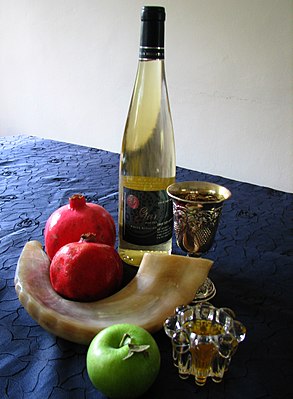
Rosh Hashana
Rosh Hashanah is a two-day celebration which begins on the first day of Tishrei, which is the seventh month of the ecclesiastical year. It marks the beginning of the civil year, according to the teachings of Judaism.
Rosh Hashanah is a two-day celebration which begins on the first day of Tishrei, which is the seventh month of the ecclesiastical year. It marks the beginning of the civil year, according to the teachings of Judaism.
Passover or Pesach, is an important, biblically derived Jewish holiday. Jews celebrate Passover as a commemoration of their liberation by God from slavery in ancient Egypt and their freedom as a nation under the leadership of Moses. It commemorates the story of the Exodus as described in the Hebrew Bible, especially in the Book of Exodus, in which the Israelites were freed from slavery in Egypt. According to standard biblical chronology, this event would have taken place at about 1300 BCE (AM 2450).
Passover is a spring festival which during the existence of the Temple in Jerusalem was connected to the offering of the "first-fruits of the barley", barley being the first grain to ripen and to be harvested in the Land of Israel.
Simchat Torah or Simhat Torah (Ashkenazi: Simchas Torah, Hebrew: שִׂמְחַת תּוֹרָה, lit., "Rejoicing of/[with the] Torah") is a Jewish holiday that celebrates and marks the conclusion of the annual cycle of public Torah readings, and the beginning of a new cycle. Simchat Torah is a component of the Biblical Jewish holiday of Shemini Atzeret ("Eighth Day of Assembly"), which follows immediately after the festival of Sukkot in the month of Tishrei (occurring in mid-September to early October on the Gregorian calendar).
Shemini Atzeret (שְׁמִינִי עֲצֶרֶת – "Eighth [day of] Assembly"; Sefardic/Israeli pron. shemini atzèret; Ashkenazic pron. shmini-atsères) is a Jewish holiday. It is celebrated on the 22nd day of the Hebrew month of Tishrei in the Land of Israel, and on the 22nd and 23rd outside the Land, usually coinciding with late September or early October. It directly follows the Jewish festival of Sukkot which is celebrated for seven days, and thus Shemini Atzeret is literally the eighth day. It is a separate—yet connected—holy day devoted to the spiritual aspects of the festival of Sukkot. Part of its duality as a holy day is that it is simultaneously considered to be both connected to Sukkot and also a separate festival in its own right.
Sukkot (Hebrew: סוכות or סֻכּוֹת, sukkōt, commonly translated as Feast of Tabernacles or Feast of the Ingathering, traditional Ashkenazi pronunciation Sukkos or Succos, literally Feast of Booths) is a biblical Jewish holiday celebrated on the 15th day of the seventh month, Tishrei (varies from late September to late October). During the existence of the Jerusalem Temple, it was one of the Three Pilgrimage Festivals on which the Israelites were commanded to perform a pilgrimage to the Temple.
Yom Kippur, also known as the Day of Atonement, is the holiest day of the year in Judaism